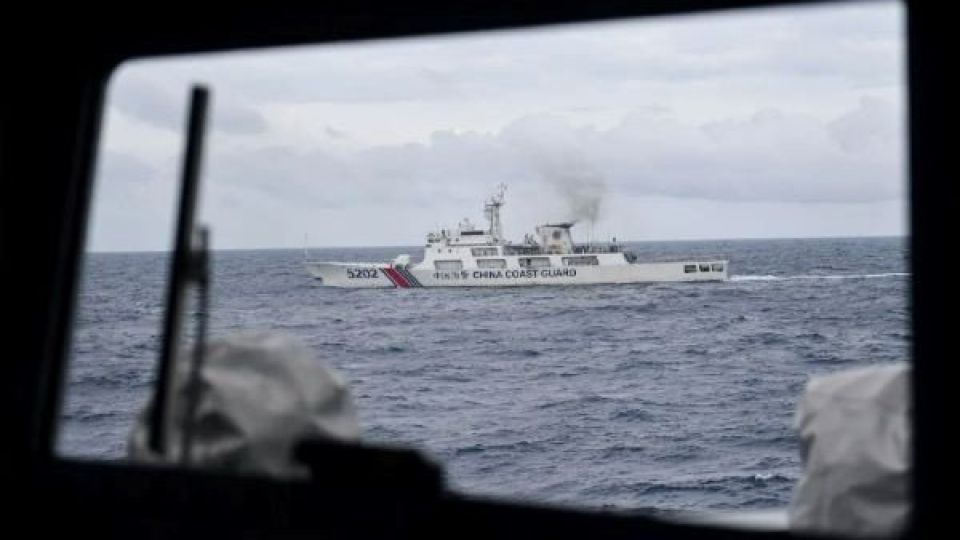October 25, 2024
JAKARTA – Indonesia’s maritime patrols drove away a Chinese coast guard vessel twice in a matter of days after it attempted to disrupt energy surveying activities in domestic waters bordering the disputed South China Sea, the latest in a series of scuffles that risked disrupting diplomatic relations.
While Chinese fishing boats and patrol ships have repeatedly intruded into Indonesia’s exclusive economic zone (EEZ), this week’s incidents follow the inauguration of Prabowo Subianto as the country’s eighth president.
Just one day after being forced out by a Maritime Security Agency (Bakamla) patrol vessel, Chinese Coast Guard (CCG) vessel 5402 reentered Indonesian waters in the North Natuna Sea on Thursday.
According to a Bakamla press statement, the agency’s director for sea operations ordered the KN Pulau Dana-323 patrol ship to intercept the Chinese vessel upon receiving reports of its unauthorized reentry.
After failing to establish communication with CCG 5402, the Indonesian vessel forced the intruders to leave the country’s continental shelf area to prevent further disruption of seismic survey activities being carried out on behalf of state energy company PT Pertamina.
Bakamla said it would continue to patrol and monitor the North Natuna Sea to ensure Indonesia’s maritime activities proceed without disruption, emphasizing the importance of protecting the country’s sovereign rights over the area, which contains significant oil and gas reserves.
It was the second time this week that the Chinese vessel had entered the region and interfered with Indonesian operations.
A similar incursion occurred on Monday, when Bakamla drove the same vessel out of the area after Beijing claimed that the waters were part of China’s jurisdiction, invoking the sweeping “nine-dash line” claim.
Indonesia has consistently rejected China’s claim, which was ruled baseless by an international tribunal in The Hague in 2016.
The latest incident also coincided with a high-level meeting in Jakarta between Indonesia’s new Defense Minister, Sjafrie Sjamsoeddin, and China’s ambassador to Indonesia, Wang Lutong, held on Thursday.
While an official statement from the Defense Ministry focused on boosting defense cooperation, including joint military exercises, there was no mention of the maritime tensions in the North Natuna Sea during the talks.
China’s foreign ministry responded to the latest incursions, with spokesperson Lin Jian stating in a press briefing in Beijing that Chinese coast guard vessels were conducting “routine patrols in waters under China’s jurisdiction in accordance with international and domestic law”.
Lin added that Beijing was “willing to strengthen communication and consultation with Indonesia” through diplomatic channels.
The Chinese Embassy in Jakarta said it had nothing else to add.
The recent incursions also came just days after President Prabowo took office, raising concerns that tensions in the North Natuna Sea may test the administration’s resolve in defending Indonesia’s waters.
Zamzami A. Karim, a political observer from Riau Islands province, suggested that Indonesia must take a stronger stance against China under Prabowo’s leadership.
“We hope that President Prabowo Subianto will adopt a stronger commitment regarding the North Natuna Sea issue,” Zamzami said.
In recent years, China has increased its deployment of coast guard and military vessels in the South China Sea, where its sweeping claims overlap with the EEZs of several Southeast Asian nations.
Indonesia, although not a claimant in the broader South China Sea territorial dispute, has faced frequent Chinese incursions into its North Natuna waters, an area believed to hold vast natural resources.
In 2017, Jakarta moved to rename the waters in the EEZ north of the Natuna Islands the “North Natuna Sea”, angering China. One of the architects of this move was recently appointed deputy foreign minister.
The territorial tussle threatens Indonesia’s close economic relationship with China, which Prabowo’s predecessor Joko “Jokowi” Widodo consummated with billions of dollars’ worth of investment.
Just before Prabowo’s inauguration, Jokowi requested to speak to China’s President Xi Jinping in a telephone conversation, to which Xi expressed “belief that the new Indonesian government will continue its friendly policy toward China”, according to the Chinese foreign ministry.
The topic was raised again when China’s Vice President Han Zheng met with Vice President Gibran Rakabuming Raka – Jokowi’s son – after the inauguration on Sunday.
While Prabowo has previously hinted at maintaining close ties with China, the ongoing tussle with China could pose a risk if left unaddressed.
Noting that it has only been days since Prabowo was inaugurated, Gadjah Mada University (UGM) international relations expert Dafri Agussalim told The Jakarta Post that the recent incident was likely carried out strategically by Beijing to “test the waters” of the current government.
“It was done to a PT Pertamina shipping vessel as well. I think this is all part of a plan to get an idea of how Prabowo’s administration would react toward some Chinese activities,” he suggested.
Bakamla’s response to intercept the Chinese ships, he added, could be fairly interpreted as a signal sent by Prabowo that his administration will not shy away from standoffs at sea to protect its sovereignty and maritime interests.
“It’s saying that Indonesia will not tolerate any threats or intimidation from foreign actors, including China,” Dafri said. (tjs)


